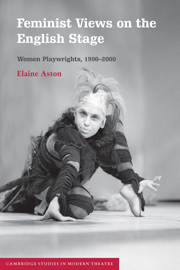Book contents
- Frontmatter
- Contents
- Acknowledgements
- 1 A feminist view on the 1990s
- 2 Telling feminist tales: Caryl Churchill
- 3 Saying no to Daddy: child sexual abuse, the ‘big hysteria’
- 4 Girl power, the new feminism?
- 5 Sarah Kane: the ‘bad girl of our stage’?
- 6 Performing identities
- 7 Feminist connections to a multicultural ‘scene’
- 8 Feminism past, and future? Timberlake Wertenbaker
- 9 Tales for the twenty-first century: final reflections
- Notes
- Bibliography
- Index
7 - Feminist connections to a multicultural ‘scene’
Published online by Cambridge University Press: 22 September 2009
- Frontmatter
- Contents
- Acknowledgements
- 1 A feminist view on the 1990s
- 2 Telling feminist tales: Caryl Churchill
- 3 Saying no to Daddy: child sexual abuse, the ‘big hysteria’
- 4 Girl power, the new feminism?
- 5 Sarah Kane: the ‘bad girl of our stage’?
- 6 Performing identities
- 7 Feminist connections to a multicultural ‘scene’
- 8 Feminism past, and future? Timberlake Wertenbaker
- 9 Tales for the twenty-first century: final reflections
- Notes
- Bibliography
- Index
Summary
The ‘violence’ of naming, of being known as a ‘woman playwright’ or a ‘lesbian writer’, gets further complicated for those writers who find themselves labelled as a ‘black woman playwright’. As Winsome Pinnock, the first of the black and Asian writers and companies to be discussed in this chapter complains: ‘When I started writing I was constantly being asked whether I considered myself a black playwright, a woman playwright, a black woman playwright or just a playwright – as though I could choose different identities!’ Writing in a post-1970s period, however, it was often necessary to choose between race and gender: between writing for a black company, not necessarily concerned with gender, or a women's company, not necessarily interested in race. To get a play published might mean inclusion in the Methuen Plays by Women series, or, later on, appearing in the Black Play volumes, edited by Yvonne Brewster, director of Talawa.
As a response to this, and given the then funding opportunities for forming small-scale companies, some black women practitioners set up their own groups, such as Theatre of Black Women or Iamni-Faith. Such companies devised, wrote and performed work that gave expression to socially and culturally neglected experiences of black women. At the same time, some of the established women's companies, notably The Women's Theatre Group, gradually began to recognise the need to transform the all-white composition of their membership.
- Type
- Chapter
- Information
- Feminist Views on the English StageWomen Playwrights, 1990–2000, pp. 125 - 148Publisher: Cambridge University PressPrint publication year: 2003



